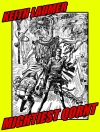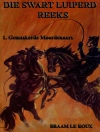It was the third-largest bestseller of its time, after Uncle Tom’s Cabin and Ben-Hur: A Tale of the Christ. It influenced a large number of intellectuals, and appears by title in many of the major Marxist writings of the day. ‘It is one of the few books ever published that created almost immediately on its appearance a political mass movement’.
Edward Bellamy’s classic look at the future has been translated into over twenty languages and is the most widely read novel of its time. A young Boston gentleman is mysteriously transported from the nineteenth to the twenty-first century — from a world of war and want to one of peace and plenty. This brilliant vision became the blueprint of utopia that stimulated some of the greatest thinkers of our age.
Bellamy’s novel tells the story of a hero figure named Julian West, a young American who, towards the end of the 19th century, falls into a deep, hypnosis-induced sleep and wakes up one hundred and thirteen years later. He finds himself in the same location (Boston, Massachusetts), but in a totally changed world: It is the year 2000 and, while he was sleeping, the United States has been transformed into a socialist utopia. The remainder of the book outlines Bellamy’s thoughts about improving the future. The major themes include problems associated with capitalism, a proposed socialist solution of a nationalization of all industry, the use of an ‘industrial army’ to organize production and distribution, as well as how to ensure free cultural production under such conditions.
The young man readily finds a guide, Doctor Leete, who shows him around and explains all the advances of this new age; including drastically reduced working hours for people performing menial jobs and almost instantaneous, Internet-like delivery of goods. Everyone retires with full benefits at age 45, and may eat in any of the public kitchens. The productive capacity of the United States is nationally owned, and the goods of society are equally distributed to its citizens. A considerable portion of the book is dialogue between Leete and West wherein West expresses his confusion about how the future society works and Leete explains the answers using various methods, such as metaphors or direct comparisons with 19th-century society.
Although Bellamy’s novel did not discuss technology or the economy in detail, commentators frequently compare Looking Backward with actual economic and technological developments. For example, Julian West is taken to a store which somewhat resembles a modern warehouse club like BJ’s, Costco, or Sam’s Club. All citizens receive an equal amount of ‘credit.’ Those with more difficult, specialized, dangerous or unpleasant jobs work fewer hours (in contrast to the real-world practice of paying them more for their efforts of, presumably, the same hours). Bellamy also predicts both sermons and music being available in the home through cable ‘telephone’. Bellamy labeled the philosophy behind the vision ‘nationalism’, and his work inspired the formation of more than 160 Nationalist Clubs to propagate his ideas.
Edward Bellamy
Looking Backward [EPUB ebook]
From 2000 to 1887
Looking Backward [EPUB ebook]
From 2000 to 1887
ซื้อ eBook เล่มนี้และรับฟรีอีก 1 เล่ม!
ภาษา อังกฤษ ● รูป EPUB ● ISBN 9788822802224 ● ขนาดไฟล์ 0.2 MB ● สำนักพิมพ์ BertaBooks ● การตีพิมพ์ 2017 ● ที่สามารถดาวน์โหลดได้ 24 เดือน ● เงินตรา EUR ● ID 5262534 ● ป้องกันการคัดลอก ไม่มี












